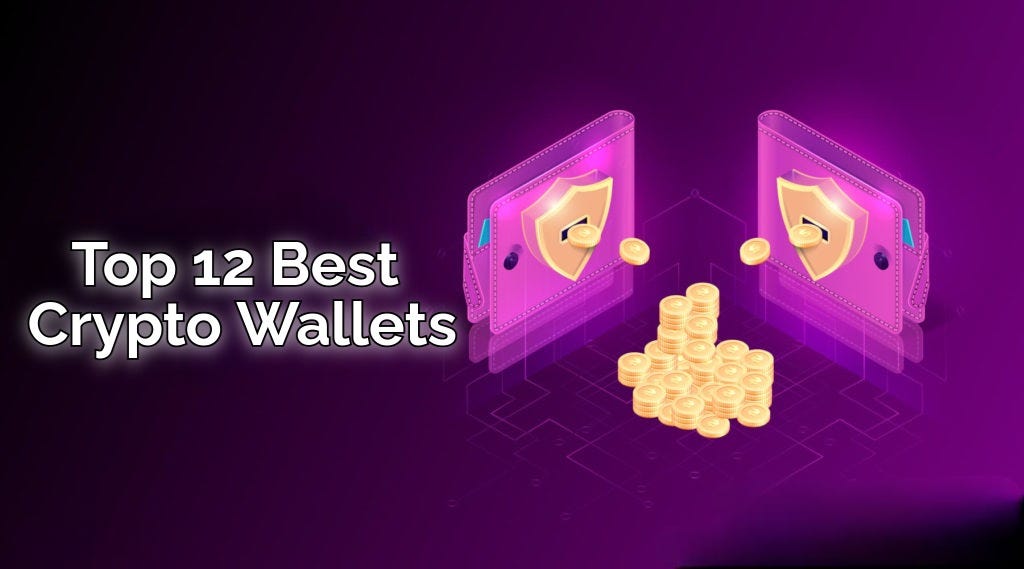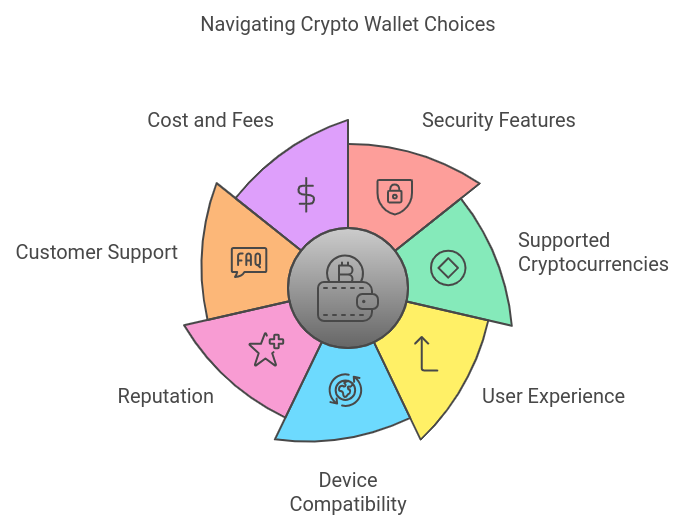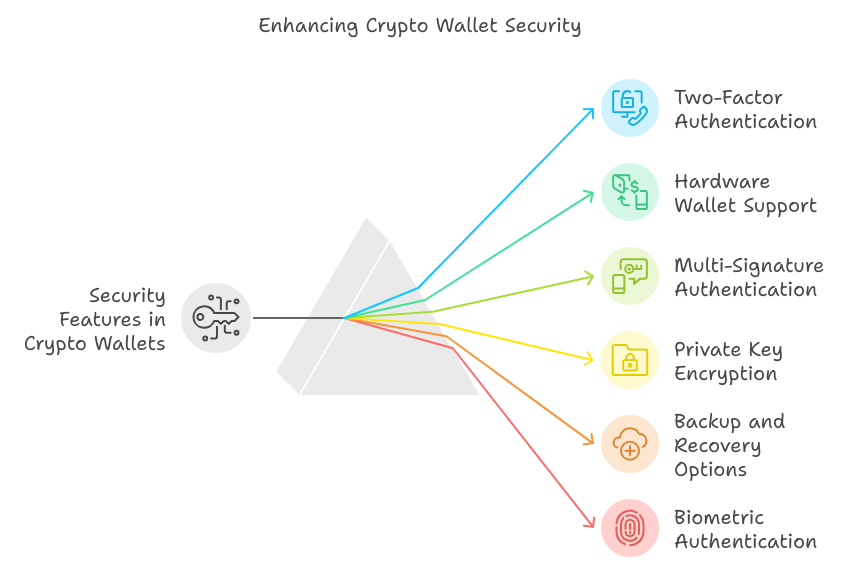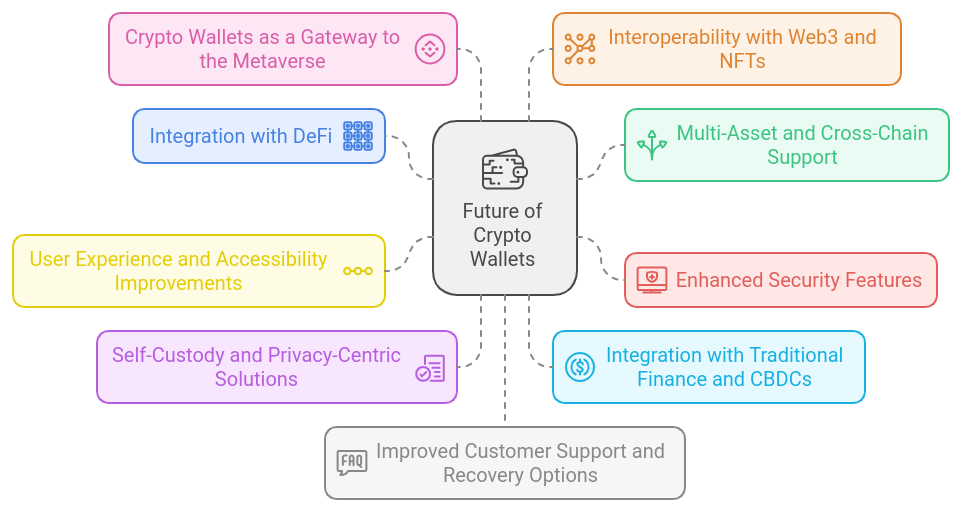Top 12 Best Crypto Wallets to Use in 2025
As cryptocurrency continues to grow in popularity, securing digital assets has become a critical concern for investors and traders. With an increasing number of crypto wallets available in the market, it can be overwhelming to choose the right one. The ideal crypto wallet should offer security, user-friendliness, and support for a wide range of cryptocurrencies. Whether you’re a beginner or an experienced crypto investor, selecting the right wallet can make all the difference in protecting your funds and simplifying your trading experience.

In 2025, we are seeing a new wave of innovation in the crypto wallet space, with improved features, security protocols, and compatibility with decentralized applications (dApps). From hardware wallets that provide top-tier offline security to software wallets offering ease of use and quick access, the options are diverse. In this guide, we will highlight the top 12 crypto wallets of 2025, focusing on their unique features, strengths, and how they stand out in the evolving crypto landscape.
Table Of ContentUnderstanding Crypto WalletsTop 12 Crypto Wallets of 2025
∘ 1. Ledger Nano X
∘ 2. Trezor Model T
∘ 3. MetaMask
∘ 4. Trust Wallet
∘ 5. Exodus Wallet
∘ 6. Electrum Wallet
∘ 7. Coinbase Wallet
∘ 8. Mycelium Wallet
∘ 9. Armory Wallet
∘ 10. Blockchain Wallet
∘ 11. ZenGo Wallet
∘ 12. BitPay Wallet
How to Choose the Right Crypto Wallet
Security Features in Crypto Wallets
The Future of Crypto Wallets
Conclusion
FAQsUnderstanding Crypto Wallets
A crypto wallet is a digital tool that allows users to store, manage, and transact with cryptocurrencies. It functions similarly to a traditional wallet, but instead of holding physical cash, it stores cryptographic keys that enable access to blockchain-based assets. Crypto wallets come in two main types: hot wallets, which are connected to the internet and offer easy access for frequent transactions, and cold wallets, which store assets offline for added security. These wallets can support a variety of cryptocurrencies, and their security features, such as private key encryption and two-factor authentication, are essential in protecting users’ funds from theft and hacking.
Top 12 Crypto Wallets of 20251. Ledger Nano XOverview:
The Ledger Nano X is a top-tier hardware wallet known for its robust security features. It supports over 1,800 cryptocurrencies and offers Bluetooth functionality for mobile access. The device provides offline storage, ensuring your private keys are never exposed to the internet.
Key Features:
- Bluetooth support for mobile devices
- Secure element (CC EAL5+) for storing private keys
- Supports over 1,800 cryptocurrencies
- Mobile and desktop apps for managing assets
- Backup and recovery options for safety
Why It’s Popular in 2025:
The Ledger Nano X remains a popular choice for crypto enthusiasts due to its state-of-the-art security features. It’s highly regarded for its protection against hacks and theft, providing peace of mind to users. The device’s Bluetooth capability makes it convenient for mobile access, and its wide cryptocurrency support attracts a diverse group of users.
Overview:
Trezor Model T is a premium hardware wallet designed for serious crypto investors. It offers a touchscreen interface, advanced security features, and multi-currency support. Known for its intuitive design, the Model T allows users to manage their assets with ease and confidence.
Key Features:
- Touchscreen interface for easy navigation
- Supports over 1,600 cryptocurrencies
- Shamir Backup for extra security
- Compatibility with major operating systems
- Open-source software
Why It’s Popular in 2025:
Trezor continues to be one of the most trusted hardware wallets in the market. Its user-friendly interface, coupled with robust security features like Shamir Backup, makes it highly popular in 2025. The wallet is favored by both beginners and advanced users for its seamless experience and open-source software that ensures transparency.
Overview:
MetaMask is one of the leading software wallets designed for Ethereum and ERC-20 token users. It functions as a browser extension and mobile app, allowing users to easily interact with decentralized applications (dApps) and manage Ethereum-based assets.
Key Features:
- Browser extension and mobile app support
- Integration with Ethereum-based dApps
- Private key management and secure login
- Easy-to-use interface
- Multi-token support
Why It’s Popular in 2025:
MetaMask’s popularity has soared due to its compatibility with DeFi platforms and dApps. In 2025, it remains a go-to wallet for Ethereum users, allowing seamless interaction with decentralized networks. Its straightforward interface and powerful features have made it essential for anyone exploring the Ethereum ecosystem.
Overview:
Trust Wallet is a versatile mobile wallet supporting a wide range of cryptocurrencies and tokens. It’s a non-custodial wallet, meaning users retain control of their private keys, and it is widely used in decentralized finance (DeFi) activities.
Key Features:
- Supports a variety of cryptocurrencies and tokens
- Non-custodial and decentralized
- Integrated with Binance DEX
- Built-in Web3 browser for DeFi access
- Multi-currency support
Why It’s Popular in 2025:
Trust Wallet’s ease of use, mobile accessibility, and broad token support make it an attractive option in 2025. With the rise of DeFi and decentralized exchanges, Trust Wallet has positioned itself as one of the best wallets for users wanting to engage in these rapidly growing sectors of the crypto space.
Overview:
Exodus Wallet is a popular software wallet that offers an intuitive and attractive design. It supports a wide array of cryptocurrencies and allows users to manage their assets on desktop and mobile platforms with ease.
Key Features:
- User-friendly interface
- Multi-currency support
- Built-in exchange for swapping cryptocurrencies
- Hardware wallet integration with Trezor
- 24/7 live chat support
Why It’s Popular in 2025:
Exodus stands out for its sleek design and ease of use. Its integrated exchange feature allows users to trade assets without leaving the app, making it a popular choice for newcomers. The wallet’s integration with Trezor hardware wallets further enhances its security offerings, making it a top pick for crypto users in 2025.
Overview:
Electrum is a lightweight Bitcoin wallet known for its speed and low resource usage. It offers robust security features, including multi-signature support, and is designed for Bitcoin enthusiasts who need a fast, reliable wallet.
Key Features:
- Lightning-fast transactions
- Multi-signature and two-factor authentication (2FA)
- Customizable transaction fees
- Integration with hardware wallets
- Open-source
Why It’s Popular in 2025:
Electrum’s fast processing and low resource usage have made it a favorite among Bitcoin traders. It remains popular in 2025 due to its security features and reliability. Users appreciate its ability to quickly process Bitcoin transactions while offering enhanced security with multi-signature support.
Overview:
Coinbase Wallet is a user-friendly, non-custodial wallet designed by the popular Coinbase exchange. It allows users to store a wide range of cryptocurrencies, interact with dApps, and even manage NFTs.
Key Features:
- Non-custodial with private key control
- Supports various cryptocurrencies and NFTs
- Built-in dApp browser
- Integration with Coinbase exchange for easy transfers
- Secure with biometric login options
Why It’s Popular in 2025:
Coinbase Wallet’s integration with the Coinbase exchange makes it incredibly convenient for users to manage both their wallet and exchange accounts. Its support for NFTs and easy access to decentralized apps have made it a top choice for users in 2025, especially for beginners looking for a seamless experience.
Overview:
Mycelium is a mobile-only wallet that focuses heavily on privacy and security. It is designed for advanced users, offering features like hardware wallet support, encrypted cloud backup, and an in-app marketplace for Bitcoin-related services.
Key Features:
- Privacy-focused with encrypted cloud backups
- Hardware wallet support (Ledger, Trezor)
- In-app marketplace for Bitcoin services
- Local trader feature for peer-to-peer transactions
- Multi-signature support
Why It’s Popular in 2025:
Mycelium is favored for its robust privacy features and support for hardware wallets. Its unique peer-to-peer trading option makes it popular among advanced users. The wallet’s focus on security ensures that it remains a top contender in 2025.
Overview:
Armory is a highly secure Bitcoin wallet designed for advanced users who prioritize control and safety. It offers features like cold storage and multi-signature support, making it one of the most secure Bitcoin wallets available.
Key Features:
- Cold storage for offline security
- Multi-signature support for extra protection
- Full control over private keys
- Bitcoin-only wallet with advanced features
- Open-source
Why It’s Popular in 2025:
Armory’s advanced security features make it a favorite among seasoned Bitcoin users. Its offline storage options provide peace of mind, and its control over private keys ensures that it remains a trusted choice in 2025.
Overview:
Blockchain Wallet is a web-based wallet that offers easy access to a variety of cryptocurrencies. It’s ideal for users who prioritize simplicity and straightforward transactions.
Key Features:
- Web-based wallet for easy access
- Multi-currency support (Bitcoin, Ethereum, etc.)
- Simple user interface
- Built-in exchange for trading crypto
- Secure private key management
Why It’s Popular in 2025:
Blockchain Wallet’s ease of use and its focus on accessibility have made it a popular choice for new crypto users. Its web-based nature and multi-currency support ensure that it remains relevant in 2025.
Overview:
ZenGo is a revolutionary non-custodial wallet that uses facial recognition for enhanced security. It supports a wide range of cryptocurrencies and boasts zero private key management, relying on a threshold signature scheme for user authentication.
Key Features:
- Biometric security (facial recognition)
- Non-custodial with zero private key management
- Support for multiple cryptocurrencies
- Integrated with DeFi and NFT platforms
- Easy recovery options
Why It’s Popular in 2025:
ZenGo’s innovative approach to security has made it one of the most secure and user-friendly wallets on the market. Its facial recognition feature provides a unique and convenient way to access crypto, and its support for DeFi and NFTs makes it a favorite among crypto users in 2025.
Overview:
BitPay Wallet is a multi-currency wallet with an emphasis on cryptocurrency payments. It allows users to store and manage a wide range of cryptocurrencies, offering direct integration with the BitPay payment platform.
Key Features:
- Multi-currency support
- Integration with BitPay for seamless crypto payments
- Built-in exchange functionality
- Secure private key management
- Payment tracking features
Why It’s Popular in 2025:
BitPay Wallet is widely used for its seamless integration with the BitPay payment platform, making it a top choice for users who want to spend their crypto easily. Its support for various cryptocurrencies and easy-to-use interface ensures that it remains a popular wallet in 2025.
Choosing the right crypto wallet is a crucial step for anyone involved in cryptocurrency investments, trading, or storage. With the vast array of options available, it can be overwhelming to make the right choice. The key factors to consider include security, ease of use, compatibility, and specific needs like the type of cryptocurrencies you want to store. Here’s a detailed guide to help you make an informed decision:
 1. Understand the Types of Crypto Wallets
1. Understand the Types of Crypto WalletsThere are two main types of crypto wallets: hot wallets and cold wallets.
- Hot Wallets: These are software-based wallets that are connected to the internet, making them more convenient for frequent transactions. They are ideal for users who need quick access to their crypto for trading or other activities.
- Examples: Mobile wallets (e.g., Trust Wallet, MetaMask), web wallets (e.g., Blockchain Wallet), and desktop wallets (e.g., Exodus).
- Cold Wallets: These are hardware devices that store your crypto offline, providing enhanced security. They are the best choice for users who don’t need to access their crypto frequently and prioritize safety over convenience.
- Examples: Ledger Nano S, Ledger Nano X, Trezor.
Security is the most critical aspect of any crypto wallet. Look for wallets that offer the following features:
- Private Key Control: Ensure the wallet allows you to retain control over your private keys. If you don’t control your keys, you don’t control your crypto.
- Two-Factor Authentication (2FA): This adds an extra layer of security by requiring a second verification step, making unauthorized access much harder.
- Multi-Signature Support: This requires multiple approvals for transactions, enhancing security.
- Backup & Recovery Options: Ensure the wallet offers secure backup and recovery options like seed phrases (mnemonics), so you can restore access if your device is lost or compromised.
If you plan to store multiple types of cryptocurrencies, ensure the wallet supports the tokens you need. Some wallets are multi-currency, while others are designed to support only specific coins or tokens. For example:
- Multi-Currency Wallets: Trust Wallet, Exodus, and MetaMask support a wide range of cryptocurrencies, including Bitcoin, Ethereum, and various altcoins.
- Single-Currency Wallets: Some wallets are built to store only one cryptocurrency, like the Bitcoin-only wallet, BlueWallet, which is focused solely on BTC.
The wallet’s user interface should be easy to navigate, especially if you’re new to cryptocurrencies. Look for wallets that are simple to use, even for beginners. Features like seamless transaction history, easy address management, and intuitive design can make your crypto experience much more pleasant. Check reviews or try out wallets with demo versions to get a feel for their usability.
5. Compatibility with Devices and PlatformsMake sure the wallet is compatible with the device or platform you intend to use. Many wallets offer mobile apps for iOS and Android, while others may have desktop versions or web extensions. Additionally, ensure the wallet supports integration with exchanges or decentralized finance (DeFi) platforms if that is part of your usage needs.
6. Reputation and ReviewsDo thorough research on the wallet’s reputation in the crypto community. Look for reviews, ratings, and feedback from other users to gauge its reliability and security features. Established wallets like Ledger and Trezor have solid reputations in the market, while new wallets might require extra caution.
7. Customer SupportGood customer support is crucial in case you run into issues with your wallet. Look for wallets that provide easily accessible customer service channels, such as live chat, email support, or active community forums.
8. Cost and FeesWhile most wallets are free, some hardware wallets come with a price tag. Compare the costs of different wallets, keeping in mind that high-end security solutions like hardware wallets are worth the investment, especially for long-term holders. Also, check for any transaction fees associated with the wallet when making transfers.
Security Features in Crypto WalletsAs the use of cryptocurrencies continues to grow, securing digital assets has become a top priority. Crypto wallets offer a variety of security features to protect users from potential hacks and thefts. Here are seven essential security features to look for in crypto wallets:
 1. Two-Factor Authentication (2FA)
1. Two-Factor Authentication (2FA)Two-Factor Authentication (2FA) adds an extra layer of security by requiring two forms of identification, such as a password and a unique code sent to your phone. This significantly reduces the risk of unauthorized access to your wallet.
2. Hardware Wallet SupportHardware wallets store private keys offline, making them immune to online hacks. These wallets provide the highest level of security by ensuring your assets remain in cold storage and are only accessible through physical devices.
3. Multi-Signature AuthenticationMulti-signature wallets require more than one private key to authorize transactions. This added layer of security ensures that even if one key is compromised, the wallet cannot be accessed or used without the other signatures.
4. Private Key EncryptionPrivate key encryption protects your wallet’s private keys from unauthorized access. Encrypted keys ensure that only the wallet holder has access to the funds, even if the device is lost or stolen.
5. Backup and Recovery OptionsGood crypto wallets offer secure backup and recovery options, such as seed phrases. These allow users to recover their wallet if their device is lost or damaged, providing a critical safety net for wallet access.
6. Biometric AuthenticationBiometric security features, such as fingerprint or facial recognition, allow users to securely access their wallets with their unique biometric data. This provides a seamless yet highly secure way to authenticate transactions.
7. Anti-Phishing ProtectionAnti-phishing features prevent users from falling victim to malicious attempts to steal sensitive information. These features alert users of potential phishing attacks and block fraudulent sites from interacting with the wallet.
The Future of Crypto WalletsCrypto wallets have evolved significantly since the inception of Bitcoin, offering users a secure way to store, send, and receive cryptocurrencies. As the cryptocurrency ecosystem continues to grow and develop, the future of crypto wallets will be shaped by technological advancements, new use cases, and the changing needs of the global crypto community. Here’s a look at the key trends and developments shaping the future of crypto wallets:
 1. Integration with Decentralized Finance (DeFi)
1. Integration with Decentralized Finance (DeFi)As DeFi continues to disrupt traditional financial systems, crypto wallets are evolving to seamlessly integrate with decentralized finance applications. In the future, wallets will act as gateways to DeFi platforms, allowing users to easily access lending, borrowing, staking, and yield farming opportunities directly from their wallets. This integration will streamline the process of engaging with DeFi, making it easier for both new and experienced users to interact with decentralized protocols.
2. Multi-Asset and Cross-Chain SupportThe future of crypto wallets will likely see a shift towards multi-asset support. As the number of cryptocurrencies and tokens grows, wallets will increasingly support a wide variety of assets, including altcoins, stablecoins, NFTs (non-fungible tokens), and even digital currencies issued by central banks (CBDCs). Cross-chain compatibility will be a key feature, allowing users to manage assets from different blockchains, such as Ethereum, Bitcoin, Solana, and Polkadot, in one unified wallet interface. This will make it easier for users to diversify their portfolios and engage with a broader range of digital assets.
3. Enhanced Security FeaturesAs the crypto space becomes more attractive to both investors and cybercriminals, security will remain a top priority. Future wallets will incorporate advanced security measures, including:
- Biometric Authentication: Features like fingerprint scanning or facial recognition will be integrated to enhance security without compromising user convenience.
- Multi-Signature and Threshold Signatures: Multi-signature support will become more widespread, allowing users to set up complex security protocols requiring multiple approvals before transactions can occur. This will be especially important for corporate and institutional users.
- Quantum-Resistant Cryptography: With the potential rise of quantum computing, wallets will need to adopt quantum-resistant encryption methods to secure private keys against future threats.
The future of crypto wallets will place a stronger emphasis on user-friendly experiences. As blockchain technology becomes more mainstream, wallets will become more intuitive and accessible to a broader audience. Wallet interfaces will simplify complex processes, such as transaction signing and gas fee management, to make crypto usage seamless for beginners. Integration with mobile apps, web browsers, and even hardware devices will become more streamlined, allowing users to manage their assets across different platforms with ease.
5. Self-Custody and Privacy-Centric SolutionsAs privacy concerns grow, there will be an increasing demand for self-custody wallets, where users control their private keys and assets without relying on centralized exchanges or third parties. Privacy features, such as zero-knowledge proofs and anonymous transactions, will likely become more common in wallets, allowing users to maintain control over their data and financial activities. These privacy-enhancing features will be critical as users seek to maintain anonymity in a highly regulated and surveilled digital environment.
6. Integration with Traditional Finance and Central Bank Digital Currencies (CBDCs)As governments around the world experiment with Central Bank Digital Currencies (CBDCs), crypto wallets will need to evolve to support these new forms of digital money. In the future, wallets could allow users to hold both traditional cryptocurrencies like Bitcoin and Ethereum, as well as CBDCs issued by their national governments. This integration will bridge the gap between decentralized finance and traditional banking, creating a more unified financial system.
7. Crypto Wallets as a Gateway to the MetaverseWith the rise of the metaverse and virtual worlds, crypto wallets will play a key role in enabling users to buy, sell, and trade digital assets within these virtual environments. Future wallets will likely integrate with metaverse platforms to store digital collectibles, virtual real estate, and in-game assets. These wallets will act as the central hub for managing digital identities, assets, and transactions in virtual spaces, making them an essential tool for users engaging in the metaverse economy.
8. Interoperability with Web3 and NFTsThe growing popularity of Web3 technologies and NFTs will also influence the future of crypto wallets. As the Web3 ecosystem expands, wallets will become essential tools for interacting with decentralized applications (dApps), smart contracts, and NFTs. Future wallets will make it easier to manage NFTs, enabling users to seamlessly store, transfer, and showcase their digital collectibles. This will help unlock new use cases for NFTs in gaming, art, and beyond.
9. Improved Customer Support and Recovery OptionsAs crypto adoption grows, customer support will become a critical aspect of wallet development. Future wallets will likely feature better customer support options, including in-app chatbots, live support, and community forums. Additionally, wallet recovery mechanisms will improve, with more intuitive and secure ways to restore access to lost or compromised wallets. Features like social recovery — where trusted contacts can help restore access to a wallet — will become more common.
ConclusionSelecting the best crypto wallet development is crucial for anyone looking to manage their digital assets safely. With so many options available, it’s important to assess your personal needs, such as the type of assets you own, the level of security required, and the ease of use you desire. Hardware wallets like Ledger and Trezor remain popular for their robust security features, while software wallets like Trust Wallet and MetaMask offer more convenience and flexibility for daily transactions.
The wallets featured in this list represent the best that 2025 has to offer in terms of security, functionality, and user experience. As the crypto space continues to evolve, it’s essential to stay informed about the latest trends and wallet features to ensure your assets remain secure and easily accessible. Ultimately, choosing the right wallet is about balancing convenience with security and ensuring that your digital assets are always protected.
FAQs:- What is a crypto wallet?
A crypto wallet is a tool that allows you to store and manage your cryptocurrencies. It can be either hardware-based (physical devices) or software-based (apps or online platforms). - What types of crypto wallets are there?
There are three main types: hardware wallets (physical devices), software wallets (online or app-based), and paper wallets (offline, printed keys). - Are hardware wallets safer than software wallets?
Yes, hardware wallets are generally considered more secure since they store private keys offline, making them less vulnerable to hacking and online threats. - Can I use multiple crypto wallets?
Yes, you can use multiple wallets for different purposes, such as a hardware wallet for long-term storage and a software wallet for regular transactions. - Which crypto wallet is the best for beginners?
Software wallets like Trust Wallet and MetaMask are often recommended for beginners due to their ease of use and support for a wide range of cryptocurrencies.
Top 12 Best Crypto Wallets to Use in 2025 was originally published in Coinmonks on Medium, where people are continuing the conversation by highlighting and responding to this story.
